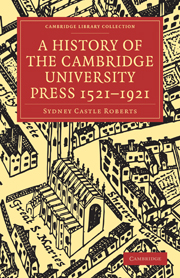Book contents
- Frontmatter
- PREFACE
- Contents
- ILLUSTRATIONS
- BIBLIOGRAPHY
- I JOHN SIBERCH
- II THE CHARTER–THOMAS THOMAS AND THE STATIONERS
- III FROM JOHN LEGATE TO ROGER DANIEL
- IV PRINTERS OF THE COMMONWEALTH AND RESTORATION
- V RICHARD BENTLEY–THE FIRST PRESS SYNDICATE
- VI EIGHTEENTH CENTURY PRINTERS
- VII THE EARLY NINETEENTH CENTURY
- VIII THE LATEST AGE
- APPENDIX
- INDEX
II - THE CHARTER–THOMAS THOMAS AND THE STATIONERS
Published online by Cambridge University Press: 05 October 2010
- Frontmatter
- PREFACE
- Contents
- ILLUSTRATIONS
- BIBLIOGRAPHY
- I JOHN SIBERCH
- II THE CHARTER–THOMAS THOMAS AND THE STATIONERS
- III FROM JOHN LEGATE TO ROGER DANIEL
- IV PRINTERS OF THE COMMONWEALTH AND RESTORATION
- V RICHARD BENTLEY–THE FIRST PRESS SYNDICATE
- VI EIGHTEENTH CENTURY PRINTERS
- VII THE EARLY NINETEENTH CENTURY
- VIII THE LATEST AGE
- APPENDIX
- INDEX
Summary
Though it may not be clear to what extent John Siberch was officially recognised as printer to the university, it is evident that no successor to him was immediately appointed. University stationers and bookbinders, however, had been for some time established in a privileged position. As early as 1276 we find a reference to the “writers, illuminators, and stationers, who serve the scholars only,” and in a note on this phrase Fuller defines the stationarii as “publicly avouching the sale of staple-books in standing shops (whence they have their names) as opposite to such circumforanean pedlers (ancestors to our modern Mercuries and hawkers) which secretly vend prohibited books.”
In 1350 John Hardy, procurator of the Corpus Christi Gild, is described as “stationarius of the University” and we learn something of the stationers' duties from the prohibition by Convocation in 1408 of the use in schools of “any book or tract compiled by John Wiclif, or any one else in his time or since or to be compiled thereafter” unless first examined by the universities and afterwards approved by the Archbishop. After the book had been finally sanctioned, it was to be delivered “in the name and by the authority of the University to the stationers to be copied; and a faithful collation being made, the original should be deposited in the chest of either University, there to remain for ever.”
- Type
- Chapter
- Information
- A History of the Cambridge University Press 1521–1921 , pp. 15 - 29Publisher: Cambridge University PressPrint publication year: 2009First published in: 1921



